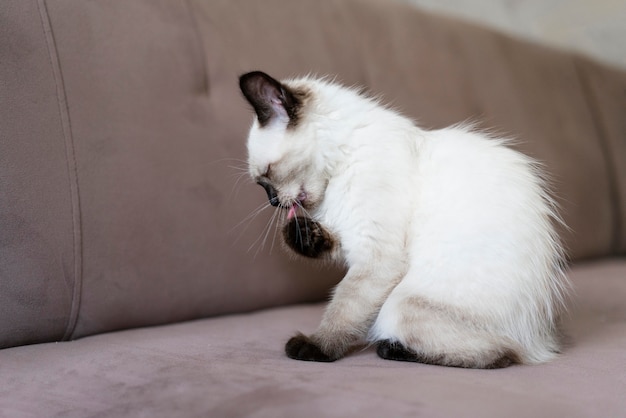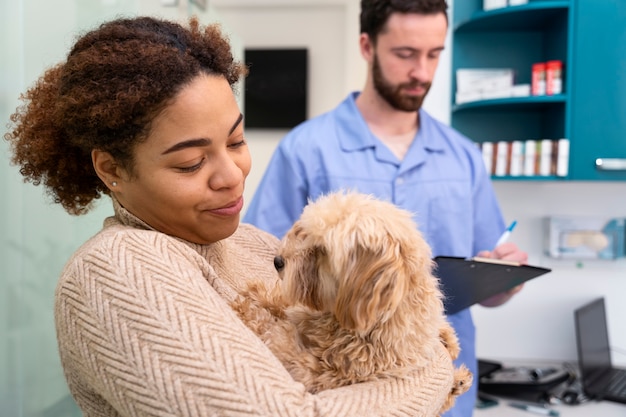Recognizing Skin Allergies in Dogs and Cats


Recognizing Skin Allergies in Dogs and Cats: Early Signs, Causes, and When to Visit Your Warner Robins Vet
As a devoted pet owner in Warner Robins, you want to ensure your dog or cat is always healthy and comfortable. Few things are more distressing than watching your furry companion scratch, lick, or chew at their skin, especially when you’re unsure what’s causing their discomfort. Skin allergies are a common source of misery for pets and owners alike, and recognizing the early pet skin allergies symptoms can make all the difference in restoring your pet’s wellbeing.
At Houston Veterinary Clinic, conveniently located at 109 Avalon Circle, Warner Robins, GA 31093, our veterinary team understands how concerning these issues can be. In this guide, we’ll help you identify the most common warning signs of skin allergies, explain possible causes like dog itchy skin causes, and outline the most effective solutions for pet skin allergies in Warner Robins and surrounding communities. You’ll also learn when it’s time to schedule a visit with a veterinarian near me and how timely intervention can prevent long-term skin problems for your dog or cat.
If you’re concerned about your pet’s skin health, we also offer specialized allergy testing services and comprehensive dermatology care to pinpoint and manage the underlying causes.
Spotting the Early Signs: Pet Skin Allergies Symptoms Every Owner Should Know
Skin allergies in pets can appear in subtle ways at first, making early detection a challenge. Recognizing pet skin allergies symptoms before they escalate is key to ensuring your dog or cat receives the care they need.
Key symptoms include persistent scratching, biting, or licking at the same area, especially on the paws, belly, or ears. Other common signs are red, inflamed skin, small bumps or scabs, hair loss in patches, and an unpleasant odor that may signal infection. You might also notice your pet rubbing their face against furniture or the carpet to relieve itching. For some pets, sneezing, watery eyes, or frequent ear infections appear alongside skin problems, indicating a broader allergic response.
Pay attention to changes in your pet’s behavior or grooming habits. An active dog in Warner Robins who suddenly becomes restless or a cat who hides more often may be experiencing discomfort from skin allergies. These signs can be more noticeable during certain seasons, as environmental allergens like pollen and mold fluctuate with the local climate.
If you observe these symptoms, documenting when and how often they occur can help your veterinarian make an accurate diagnosis. Early recognition is the first step toward effective treatment and preventing secondary infections that can complicate recovery.
Understanding Dog Itchy Skin Causes and Cat Allergy Triggers
Skin allergies in pets result from a combination of genetic, environmental, and dietary factors. In dogs, the most frequent dog itchy skin causes are flea allergy dermatitis, environmental allergens like grasses, pollens, or dust mites, and food sensitivities. Many pets in Warner Robins experience flare-ups during spring and fall, when local pollen counts are high.
Flea allergy dermatitis is particularly common in the Southeast. Even a single flea bite can set off an intense allergic reaction, leading to days of itching and skin trauma. Regular parasite prevention is crucial, even for indoor pets.
Environmental allergens are another major culprit. Pollen from local plants, molds that flourish in Georgia’s humid climate, and household dust can trigger allergic reactions in both dogs and cats. These allergens may settle on your pet’s fur or paws after a walk or playtime outside, leading to irritation long after exposure.
Some pets develop food allergies, reacting to ingredients such as beef, chicken, dairy, or grains. Unlike environmental allergies, food allergies often cause year-round skin issues, and gastrointestinal symptoms like vomiting or diarrhea may sometimes accompany the itching.
Cats are prone to a unique set of allergy triggers, including flea bites, certain cleaning products, and even some types of cat litter. If your cat grooms excessively or develops scabs around the head and neck, a skin allergy could be to blame.
Understanding these causes helps you and your veterinarian develop a targeted plan for relief and long-term management, whether your pet is suffering from seasonal allergies or ongoing sensitivities.
Veterinary Treatment and Management: How We Help Pets with Skin Allergies in Warner Robins
When you bring your pet to Houston Veterinary Clinic for pet skin allergies symptoms, our veterinarians begin with a thorough physical examination and a detailed history of your pet’s symptoms, environment, and diet. This step allows us to narrow down possible dog itchy skin causes or allergy sources in cats.
Diagnostic approaches often involve skin scrapings to check for parasites, cytology to detect infection or inflammation, and sometimes blood or intradermal tests to identify specific allergens. Our allergy testing services help pinpoint what’s triggering your pet’s reactions, enabling us to create a custom treatment plan.
Treatments for pet skin allergies in Warner Robins may include prescription medications such as anti-itch tablets, medicated shampoos, or topical ointments that soothe inflamed skin. For pets with bacterial or yeast infections secondary to allergies, targeted antibiotics or antifungal medications are prescribed. In cases where food allergies are suspected, your veterinarian may recommend a special elimination diet to identify and remove the offending ingredient.
Long-term management focuses on reducing your pet’s exposure to known allergens. For environmental allergies, strategies include frequent bathing, wiping down paws after outdoor walks, and using air purifiers in the home. Year-round flea prevention is especially important for pets in Warner Robins and surrounding communities.
At Houston Veterinary Clinic, we also offer dermatology services to address complex or chronic skin issues and support your pet’s comfort every step of the way. Our goal is to provide comprehensive, compassionate care that brings your pet lasting relief.
Preventing Skin Allergies: Home Care Tips and Everyday Strategies
While not all skin allergies can be prevented, proactive home care goes a long way in minimizing flare-ups and supporting your pet’s skin health. Regular grooming removes dirt, pollen, and other irritants from your pet’s coat. Bathing with veterinarian-recommended shampoos can help soothe itchy skin and restore the protective barrier.
Keeping your home clean by vacuuming frequently and controlling dust or mold reduces environmental allergen exposure. For dogs who enjoy outdoor activity in Warner Robins, wiping their paws and belly after walks can prevent pollen and grass allergens from lingering on the skin. Cats benefit from a clean litter box and avoiding scented litters or harsh cleaning products.
Flea prevention is essential for every pet, regardless of whether they spend time outdoors. Your veterinarian can recommend safe, effective products tailored to your pet’s needs and local risks.
Diet also plays a role in skin health. If your veterinarian suspects a food allergy, carefully following an elimination diet can help identify the culprit. Feeding a high-quality, well-balanced diet supports the immune system and skin integrity.
Monitoring changes in your pet’s skin, coat, or behavior allows you to catch early signs of trouble before they escalate. Consistent preventive care, combined with regular wellness visits, is the best way to keep pet skin allergies symptoms under control and provide your companion with a happy, comfortable life.
When to See a Veterinarian Near Me: Getting Help for Your Pet’s Skin Allergies
It’s important to know when home management isn’t enough. You should schedule a veterinary visit if your pet’s itching persists for more than a few days, if they develop open sores, scabs, or hair loss, or if you notice any swelling, foul odor, or changes in appetite or energy. Sudden or severe reactions, such as facial swelling or difficulty breathing, are medical emergencies and require immediate attention.
Early intervention by a veterinarian near me can prevent minor symptoms from progressing to chronic or severe skin conditions. At Houston Veterinary Clinic, we encourage you to schedule an appointment as soon as you notice signs of discomfort. Our veterinary professionals will work with you to identify the underlying causes, provide relief, and develop a plan that fits your pet’s unique needs.
For ongoing or seasonal concerns, regular wellness exams allow our veterinarians to monitor your pet’s skin health and adjust preventive strategies as the seasons or your pet’s lifestyle change.
If you are unsure whether your pet’s symptoms warrant a visit, our team is happy to provide guidance over the phone and help you decide on next steps.
Supporting Your Pet’s Health: Schedule an Appointment with Houston Veterinary Clinic
Skin allergies can be frustrating for both pets and their families, but with the right support and timely intervention, your dog or cat can enjoy lasting comfort. Recognizing pet skin allergies symptoms early and understanding the most common dog itchy skin causes empowers you to make informed decisions about your pet’s care.
At Houston Veterinary Clinic, we take pride in serving Warner Robins and surrounding communities with compassionate, comprehensive veterinary services. If you are searching for a vet near me who understands the unique challenges of pet skin allergies in Warner Robins, our team is here for you. We encourage you to schedule an appointment for allergy testing, dermatology care, or a thorough wellness exam to give your pet the healthiest skin possible.
Call us today at (478) 929-0361 to book your visit, or stop by our convenient location at 109 Avalon Circle, Warner Robins, GA 31093. Your pet’s comfort and happiness are our highest priorities, and our veterinary professionals are dedicated to providing the best veterinary services near me for every four-legged family member.
This article is for informational purposes only and is not a substitute for professional veterinary advice. If you have concerns about your pet’s health, please consult your veterinarian.



















